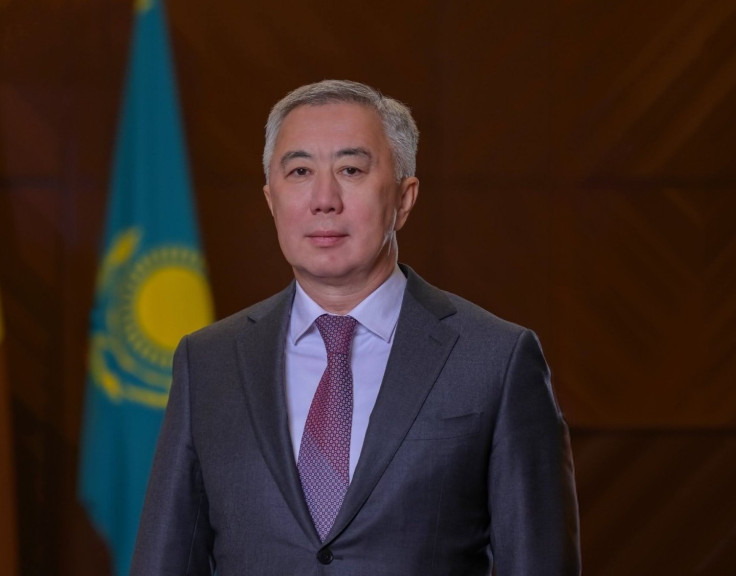The Future of Growth Lies in Emerging Middle Markets
Deputy PM Serik Zhumangarin says emerging economies like Kazakhstan are driving a new phase of globalisation

The world economy is in a state of flux. Over the past few years, we have witnessed profound disruptions—from supply chain breakdowns and geopolitical fragmentation to climate-induced shocks and energy insecurity. Economic growth in some of the world's traditional centres, from Europe to North America, has slowed amid high inflation, declining trade volumes, and increasing political volatility.
Yet, even as old certainties give way, a new economic geography is taking shape. Globalisation is not ending—it is evolving. No longer dominated by a small group of major economies, it is becoming more regionalised, more digital, and more diversified. This shift is creating space for a broader range of countries to participate actively in shaping global growth and trade. Among them are the world's emerging middle powers—agile, reform-oriented states that are increasingly influential in shaping regional and global economic patterns.
Kazakhstan is part of this evolving story. Without overstating our role, we recognise that our strategic location, steady reform trajectory, and growing international engagement position us to contribute meaningfully to the next phase of globalisation. While G7 countries will undoubtedly remain critical pillars of the global economy, the rise of new players across the Global South is reshaping the rules of engagement.
The evidence is clear: middle-income countries now account for an increasing share of global GDP growth, trade flows, and investment. As of 2023, the 108 middle-income countries accounted for approximately 40% of the global economy. These nations are home to about 75% of the world's population. Countries such as Indonesia, Türkiye, Mexico, and Vietnam are fast becoming regional anchors of economic activity and innovation. These countries are helping to diversify global production and reduce overdependence on any single geography. Kazakhstan, with its unique position in the heart of Eurasia, is ready to complement this momentum—not by replacing global powers, but by supporting the emerging multipolar economic order with regional insight, connectivity, and pragmatism.
A New Economic Geography
Kazakhstan's geography is one of its greatest assets. Situated between China and Europe, and linking Russia, South Asia, and the Caspian region, we are naturally positioned as a bridge in an increasingly fragmented global economy. In particular, the Trans-Caspian International Transport Route (TITR)—also known as the Middle Corridor—has gained renewed significance. In 2024 alone, freight volumes through the TITR increased by 86% year-on-year, highlighting its growing role as an important alternative route for goods traveling between Asia and Europe. With over 80% of transcontinental rail cargo already passing through Kazakhstan, we are not only a transit country—we are becoming a logistics and trade hub in our own right.
This transformation is underpinned by major infrastructure investments, including new railways, dry ports, and digital logistics systems that improve efficiency and transparency. Our goal is ambitious: to more than triple Kazakhstan's cargo transit capacity by 2030, increasing it from 28 million tonnes to 100 million tonnes. The launch of the Kazakh-Chinese logistics terminal in Xi'an, the development of the Aktau and Kuryk seaports, and ongoing efforts to integrate into the Global Gateway and Belt and Road initiatives all speak to this vision.
Beyond infrastructure, Kazakhstan is implementing wide-ranging economic reforms to foster resilience and diversification. According to the United Nations Economic and Social Commission for Asia and the Pacific, Kazakhstan attracted $15.7 billion in investments for new projects in 2024, an 88% increase from the previous year. These results are a reflection of growing investor confidence in Kazakhstan's political and economic stability, and in the government's commitment to improving the business climate. Under President Kassym-Jomart Tokayev's leadership, we are simplifying regulations, enhancing competition, and reducing the state's role in the economy—all critical steps toward building a more dynamic private sector.
From Transit Hub to Innovation Hub
However, our ambitions go beyond being a corridor for goods. We aim to be a hub for ideas, talent, and innovation. That is why we are investing in education, digital infrastructure, and innovation districts. Our goal is to foster a knowledge economy that can generate long-term prosperity and resilience. Drawing inspiration from middle powers like India and South Korea, we are studying how smart investment in digital public goods or focused technology sectors can transform national competitiveness. India's development of the Unified Payments Interface has revolutionised financial inclusion. South Korea's rise as a semiconductor powerhouse illustrates how targeted innovation can elevate a country's global position.
Kazakhstan is taking steps in this direction. New partnerships with global universities are expanding digital and STEM education. Tech parks in our cities of Almaty and Astana are supporting early-stage startups, while our Digital Kazakhstan strategy continues to guide investment into next-generation infrastructure.
At the international level, Kazakhstan supports a more inclusive, representative multilateralism. As the global economy becomes more complex, emerging economies must be part of shaping the frameworks that govern trade, technology, finance, and climate policy. We believe in the importance of South-South cooperation, not just in terms of trade, but also in knowledge-sharing and innovation partnerships. Our vision is not competitive but collaborative: to act as an enabler and connector across continents and disciplines.
In this context, the Astana International Forum (AIF) has become a key platform for open, cross-border dialogue. Designed as a convening space for policymakers, investors, academics, and civil society, the Forum encourages new ideas and collaborations across sectors. The upcoming 2025 edition in May will focus on key global issues such as sustainable growth and inclusive development.
Ultimately, Kazakhstan's physical infrastructure supports trade routes; our diplomatic engagement promotes dialogue; and our domestic reforms create space for innovation and investment. We believe this is what the future of globalisation looks like: not a return to a single centre of gravity, but a multipolar web of diverse, resilient, and complementary economies.
As we look ahead, we must embrace this shift. Middle powers like Kazakhstan may not dominate headlines, but we are increasingly shaping outcomes—through cooperation, reform, and long-term vision. In an era of uncertainty, we offer something the global economy urgently needs: stability, regional insight, and fresh ideas. If globalisation is to survive and evolve, it will do so through the emergence of new bridges—bridges not only of steel and trade, but of ideas and collaboration. Kazakhstan stands ready to help build them.
About the author: Serik Zhumangarin is the Deputy Prime Minister and Minister of National Economy of Kazakhstan.
© Copyright IBTimes 2025. All rights reserved.





















